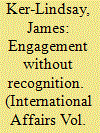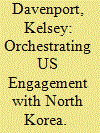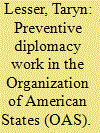| Srl | Item |
| 1 |
ID:
138346


|
|
|
|
|
| Summary/Abstract |
This article examines the extent to which states are able to interact at an official level with a contested or de facto state—a state that has unilaterally declared independence but is not a member of the United Nations—without being understood to have recognized it. This is an area of increasing interest and relevance to policy-makers as the number of contested states has grown in recent years. In many cases, interaction may be important for ongoing peace efforts. However, there are also instances when a state is prevented from recognizing the territory in question for specific domestic or foreign policy reasons and so has to find alternative means by which to cooperate. Drawing on several key examples, notably Kosovo and the ‘Turkish Republic of Northern Cyprus’, but also with reference to Abkhazia, the article explores the limits of interaction across various different forms of bilateral and multilateral diplomatic activity. As is shown, albeit with some significant provisos, legal theory and historic practice suggest that diplomatic engagement does not constitute recognition if there is no underlying intent to recognize. This means that there is in fact a very high degree of latitude regarding the limits of diplomatic engagement with contested states. This is especially the case in bilateral contexts. Indeed, in some circumstances, the level of engagement can even amount to recognition in all but name.
|
|
|
|
|
|
|
|
|
|
|
|
|
|
|
|
| 2 |
ID:
183791


|
|
|
|
|
| Summary/Abstract |
North Korea’s advancing nuclear-weapons programme poses a significant threat to US security interests, yet successive US presidents have failed to roll back this threat. The Trump administration’s failed negotiations with North Korea demonstrated that narrowly construed negotiating strategies requiring Pyongyang to take concrete steps towards denuclearisation prior to receiving any benefits are partly to blame for the lack of progress. A more productive strategy would embed verifiable steps towards denuclearisation within a broader transformation of the relationship between Washington and Pyongyang. Such a strategy would begin with an agreement between the United States and North Korea on a broad framework for denuclearisation and peacebuilding that would guide corresponding actions by both parties to achieve these goals.
|
|
|
|
|
|
|
|
|
|
|
|
|
|
|
|
| 3 |
ID:
116426


|
|
|
|
|
| Publication |
2012.
|
| Summary/Abstract |
Abstract The South American country of Guyana has a history of turmoil and violence around its presidential elections. The 2006 elections, however, were cited as largely free of violence and post-election unrest. While the peaceful outcome may be attributed to a number of factors, the involvement of the Organization of American States in setting up an electoral observation mission and in engaging in preventive diplomacy played a constructive role in the process, in addition to other ongoing initiatives. This article examines the OAS' use of its mandate for the preservation of democracy as an entry point for conflict prevention. In particular, it analyzes the role of election monitoring and the facilitation of dialogue as a form of preventive diplomacy. The article argues that the Guyana case provides an example of the OAS using its democracy promotion mandate to prevent conflict, specifically election-related violence. It also highlights some of the critiques of OAS work in the area of democracy promotion and election monitoring, noting that the organization has engaged in these activities only in selective cases that meet specific criteria.
|
|
|
|
|
|
|
|
|
|
|
|
|
|
|
|